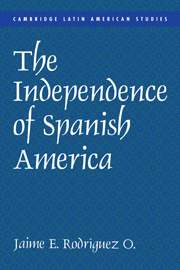Conclusion
Published online by Cambridge University Press: 05 October 2013
Summary
During the second half of the eighteenth century and the early nineteenth century, the Spanish world underwent a major transformation. The reigns of Carlos III and Carlos IV (1759–1808) witnessed the development of modern political thought – which emphasized liberty, equality, civil rights, the rule of law, representative constitutional government, and laissez-faire economics – among a small but significant group of Spaniards and Americans. As long as the Crown governed effectively, these ideas remained largely intellectual pursuits. But the French invasion of Spain and the collapse of the Monarchy in 1808 provided the liberal minority with an unprecedented opportunity to implement its goals.
The disintegration of the Crown triggered a series of events that culminated in the establishment of representative government in the Spanish world. The initial step in that process was the formation of local governing juntas in Spain and America that invoked the Hispanic legal principle that sovereignty, in the absence of the king, reverted to the people. Although the Peninsular provinces made that transition easily, the American kingdoms faced the opposition of royal officials, resident Europeans, and their New World allies. The creation of the Junta Suprema Central Gubernativa del Reino appeared to provide a solution to the crisis of the Monarchy. That body not only recognized the rights of Spanish provinces but also acknowledged that the American kingdoms constituted integral and equal parts of the Monarchy and possessed the right to representation in the government.
- Type
- Chapter
- Information
- The Independence of Spanish America , pp. 238 - 246Publisher: Cambridge University PressPrint publication year: 1998

